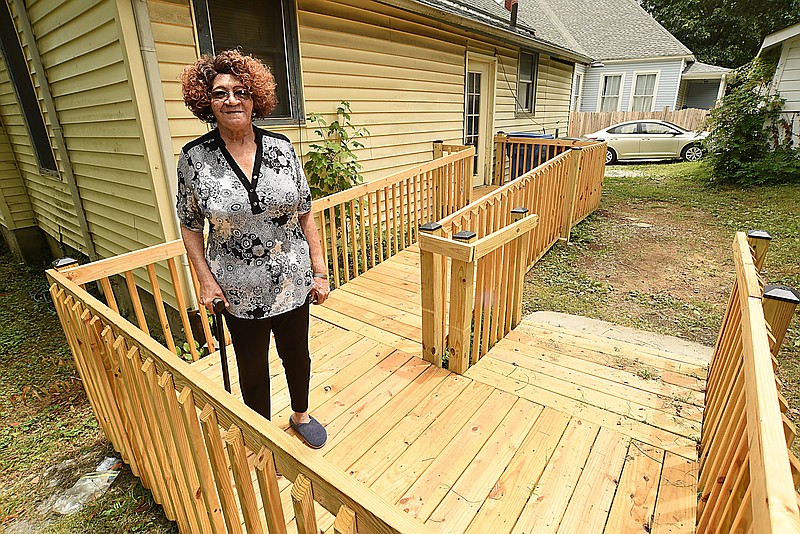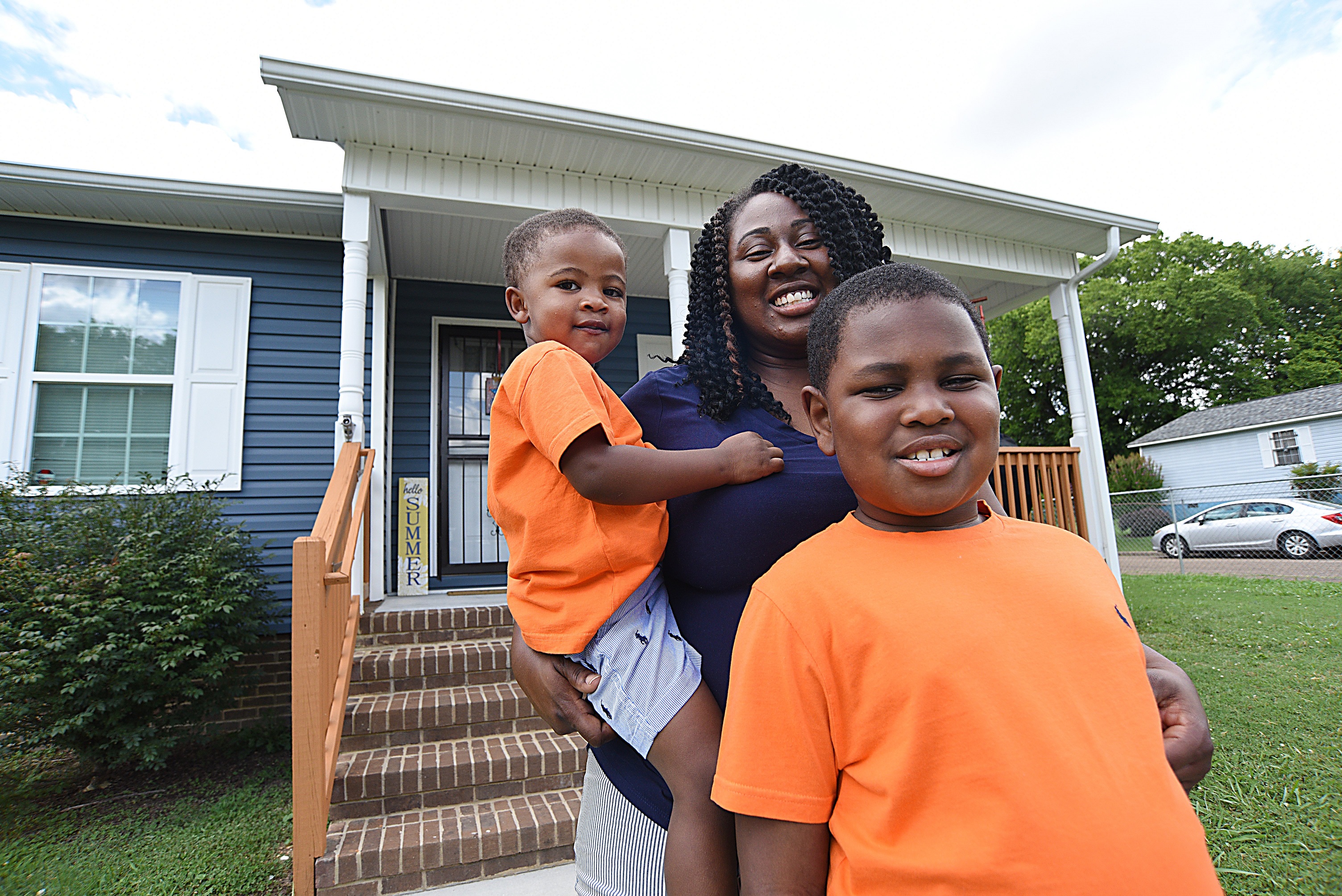The lack of affordable housing in Chattanooga is a longtime issue that's been made worse with the COVID-19 pandemic. Like the pandemic, the affordable housing crisis disproportionately affects women.
Here, we explore two illustrations of Chattanooga women who are overcoming obstacles to safe, affordable housing with the help of local organizations.
Rebuilding Together
Older adults who are able to live independently in their homes typically have a better quality of life than those who move into assisted living facilities, where they are more likely to contract viral infections. Amid the COVID-19 pandemic, having the ability to age in place could be lifesaving.
Yet a recent study from the University of Massachusetts Gerontology Institute found that more than half of older adults living on their own in the Chattanooga area do not have enough income to make ends meet without help. The Chattanooga area ranked 22nd among 100 metropolitan statistical areas across the country for the highest percentage of elderly residents facing economic hardship.
Verdell Postell has lived in her century-old home for 41 years, and it's always been home to at least three generations of her family.
She was in her 20s when she moved in with her husband, three children and mother-in-law. Her mother-in-law had just come to live with the family from a nursing home, and the St. Elmo house was a bigger place where everyone could be comfortable.
Postell raised six of her grandchildren in the home, and a granddaughter and great-granddaughter have since moved back in to help take care of her.
She has trouble with her balance and a tendency to fall, and low oxygen in her blood that leaves her out of breath just walking from one end of the house to the other.
Her balance got so bad that she couldn't get down the stairs of her front porch to pick up the morning paper. When she needed to leave the house, her granddaughter had to carry Postell on her back to get her off the stairs in the rear of the house.
"If something had happened, I wouldn't have been able to get out," Postell says.
She reached out to the local chapter of Rebuilding Together, a nonprofit organization with a mission to provide essential home repairs for low-income families, in the belief that everyone deserves a safe and healthy place to live.
Rebuilding Together provided supplies for volunteers from another organization, Neighborhood Helpers, to build a ramp with a railing on the back of the house so that Postell could get outside on her own.
Inside her home, volunteers from Rebuilding Together installed a new toilet at an Americans with Disabilities Act-compliant height, along with a grab bar, and replaced the rotting subfloor around the toilet that was sinking in. The repairs helped keep Postell from feeling the constant fear of falling when no one else was around, she says.
They also replaced a clogged dryer vent that posed a fire hazard and released lint into the kitchen where food was being prepared.
Overall, Rebuilding Together spent $2,843 on the material for the repairs, according to Angela Hardison, who handles communications for the organization's local affiliate.
"If it hadn't been for them, I wouldn't be in that house," says Postell, who hopes to stay there the rest of her years.
Habitat for Humanity
Habitat for Humanity
The pandemic has negatively affected everyone, but it's had a disproportionate effect on women.
Forty percent of working women hold jobs in health care and education - two of the hardest-hit industries in the pandemic - versus 20% of men. And as the primary caregivers in many families, women are more likely to be the parent to stay home to teach or care for children when schools and child care facilities close.
More than 60% of Habitat for Humanity homeowners in the U.S. are female head of households, who locally make up an even greater majority of Habitat homeowners. Of the 286 Habitat homes built in Hamilton County, 84.7% have a female head of household, according to Madison Bradford, development and communications manager for Habitat for Humanity of Greater Chattanooga.
"Globally, women are disproportionately affected by the lack of access to safe, decent and affordable homes," Bradford says. "Fifty-three percent of Chattanoogans are women, and of those, we have a really high population of moms trying to find a home for their children. The obstacle of finding a safe place for them to stay is challenging for many of the women in Chattanooga."
There's also the fact that women are often paid less than men, but they still have to pay the same amount for housing, Bradford says.
Torri Scott and her two young sons moved into their local Habitat home in 2016.
"You don't think that it could happen," she says of becoming a homeowner.
Growing up, Scott moved around to different rental properties on the Southside and in East Chattanooga. Her mom became a homeowner in 2007, and provided a lot of encouragement to Scott when she was making the decision to apply to Habitat. She and her older son, then 2, were living with her mother when she applied.
If it weren't for Habitat, Scott says she'd probably be raising her kids in rentals similar to the ones she lived in with her mother when she was a child. Even then, she'd have to cut down on her expenses outside of housing costs in order to afford the rent.
"I'm sure I'd really have to struggle to make ends meet," she says.
Housing costs are rising much faster than incomes all over the U.S., and local rents are among the fastest rising rates in the country - growing at more than six times the increase in average income in the past year. A recent study of apartment rental rates showed the average two-bedroom apartment in Chattanooga rents for $1,200 a month, or 17.6% more than a year before.
According to the Tennessee Housing Development Agency's 2020 housing indicators report, about 22% of the city's 84,000 renters are at "high risk" of losing their housing because they pay 50% or more of their monthly income toward housing, and another 22% are considered housing cost-burdened, meaning they pay 30-49% of their income.
Most mortgage lenders adhere to the standard that borrowers should spend no more than 28% of their income on their monthly housing payment, according to bankrate.com. That's about $612 for Chattanoogans making the median income listed by the U.S. Census Bureau for 2019, the latest data available.
The median income for individuals in Chattanooga in 2019 was $26,207, or about $2,184 a month. Habitat works with families whose incomes range from 30-80% of the median income, around $7,862-$20,966 a year or $655-$1,747 a month.
To be accepted into the program, applicants have to demonstrate need, ability to pay a zero-interest mortgage, and willingness to put in volunteer hours and take classes related to homeownership.
"It gave me peace because I can afford to pay a mortgage and still afford other things," Scott says.
The backyard is her favorite thing about the house, now a place for kids in the community to gather.
"I've purchased things I would want as a kid," Scott says of her backyard attractions, like a movie projector and an inflatable water slide. "I have the peace of knowing that my kids have their own yard to play in, and the peace of knowing they're able to do things in the yard that I wasn't able to."

